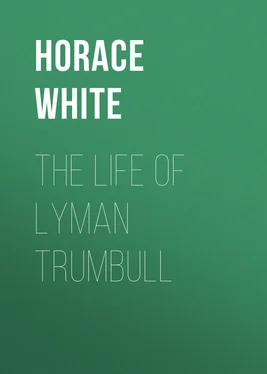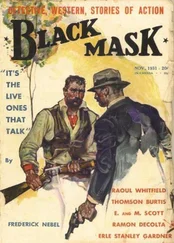Horace White - The Life of Lyman Trumbull
Здесь есть возможность читать онлайн «Horace White - The Life of Lyman Trumbull» — ознакомительный отрывок электронной книги совершенно бесплатно, а после прочтения отрывка купить полную версию. В некоторых случаях можно слушать аудио, скачать через торрент в формате fb2 и присутствует краткое содержание. Жанр: foreign_prose, История, foreign_edu, foreign_antique, на английском языке. Описание произведения, (предисловие) а так же отзывы посетителей доступны на портале библиотеки ЛибКат.
- Название:The Life of Lyman Trumbull
- Автор:
- Жанр:
- Год:неизвестен
- ISBN:нет данных
- Рейтинг книги:5 / 5. Голосов: 1
-
Избранное:Добавить в избранное
- Отзывы:
-
Ваша оценка:
- 100
- 1
- 2
- 3
- 4
- 5
The Life of Lyman Trumbull: краткое содержание, описание и аннотация
Предлагаем к чтению аннотацию, описание, краткое содержание или предисловие (зависит от того, что написал сам автор книги «The Life of Lyman Trumbull»). Если вы не нашли необходимую информацию о книге — напишите в комментариях, мы постараемся отыскать её.
The Life of Lyman Trumbull — читать онлайн ознакомительный отрывок
Ниже представлен текст книги, разбитый по страницам. Система сохранения места последней прочитанной страницы, позволяет с удобством читать онлайн бесплатно книгу «The Life of Lyman Trumbull», без необходимости каждый раз заново искать на чём Вы остановились. Поставьте закладку, и сможете в любой момент перейти на страницу, на которой закончили чтение.
Интервал:
Закладка:
His death and the manner in which he was slain will make thousands of Abolitionists, and far more than his writings would have made had he published his paper an hundred years. This transaction is looked on here, as not only a disgrace to Alton, but to the whole State. As much as I am opposed to the immediate emancipation of the slaves and to the doctrine of Abolitionism, yet I am more opposed to mob violence and outrage, and had I been in Alton, I would have cheerfully marched to the rescue of Mr. Lovejoy and his property.
Yours very affectionately,
Lyman Trumbull.
After three years of riding on the circuit, Trumbull was elected, in 1840, a member of the lower house of the state legislature from St. Clair County. In politics he was a Democrat as was his father before him. This was the twelfth general assembly of the state. Among his fellow members were Abraham Lincoln, E. D. Baker, William A. Richardson, John J. Hardin, John. A. McClernand, William H. Bissell, Thomas Drummond, and Joseph Gillespie, all of whom were destined to higher positions.
Trumbull was now twenty-seven years of age. He soon attracted notice as a debater. His style of speaking was devoid of ornament, but logical, clear-cut, and dignified, and it bore the stamp of sincerity. He had a well-furnished mind, and was never at loss for words. Nor was he ever intimidated by the number or the prestige of his opponents. He possessed calm intellectual courage, and he never declined a challenge to debate; but his manner toward his opponents was always that of a high-bred gentleman.
On the 27th of February, 1841, Stephen A. Douglas, who was Trumbull's senior by six months, resigned the office of secretary of state of Illinois to take a seat on the supreme bench, and Trumbull was appointed to the vacancy. There had been a great commotion in state politics over this office before Trumbull was appointed to it. Under the constitution of the state, the governor had the right to appoint the secretary, but nothing was said in that instrument about the power of removal. Alexander P. Field had been appointed secretary by Governor Edwards in 1828, and had remained in office under Governors Reynolds and Duncan. Originally a strong Jackson man, he was now a Whig. When Governor Carlin (Democrat) was elected in 1838 he decided to make a new appointment, but Field refused to resign and denied the governor's right to remove him. The State Senate sided with Field by refusing to confirm the new appointee, John A. McClernand. After the adjournment of the legislature, the governor reappointed McClernand, who sued out a writ of quo warranto to oust Field. The supreme court, consisting of four members, three of whom were Whigs, decided in favor of Field. The Democrats then determined to reform the judiciary. They passed a bill in the legislature adding five new judges to the supreme bench. "It was," says historian Ford, "confessedly a violent and somewhat revolutionary measure and could never have succeeded except in times of great party excitement." In the mean time Field had retired and the governor had appointed Douglas secretary of state, and Douglas was himself appointed one of the five new members of the supreme court. Accordingly he resigned, after holding the office only two months, and Trumbull was appointed to the vacancy without his own solicitation or desire.
Two letters written by Trumbull in 1842 acquaint us with the fact that his brother Benjamin had removed with his family from Colchester to Springfield and was performing routine duties in the office of the secretary of state, while Trumbull occupied his own time for the most part in the practice of law before the supreme court. He adds: "I make use of one of the committee rooms in the State House as a sleeping-room, so you see I almost live in the State House, and am the only person who sleeps in it. The court meets here and all the business I do is within the building." Not quite all, for in another letter (November 27, 1842) he confides to his sister Julia that a certain young lady in Springfield was as charming as ever, but that he had not offered her his hand in marriage, and that even if he should do so, it was not certain that she would accept it.
Trumbull had held the office of secretary of state two years when his resignation was requested by Governor Carlin's successor in office, Thomas Ford, author of a History of Illinois from 1814 to 1847 . In his book Ford tells his reasons for asking Trumbull's resignation. They had formed different opinions respecting an important question of public policy, and Trumbull, although holding a subordinate office, had made a public speech in opposition to the governor's views. 10 10 The following correspondence passed between them: Springfield, March 4, 1843. Lyman Trumbull, Esq., Dear Sir: It is my desire, in pursuance of the expressed wish of the Democracy, to make a nomination of Secretary of State, and I hope you will enable me to do so without embarrassing myself. I am most respectfully, Your obedient servant, Thomas Ford. Springfield, March 4, 1843. To His Excellency, Thomas Ford: Sir,—In reply to your note of this date this moment handed me, I have only to state that I recognize fully your right, at any time, to make a nomination of Secretary of State. Yours respectfully, Lyman Trumbull.
Of course he did this on his own responsibility as a citizen and a member of the same party as the governor. He acknowledged the governor's right to remove him, and he made no complaint against the exercise of it.
The question of public policy at issue between Ford and Trumbull related to the State Bank, which had failed in February, 1842, and whose circulating notes, amounting to nearly $3,000,000, had fallen to a discount of fifty cents on the dollar. Acts legalizing the bank's suspension had been passed from time to time and things had gone from bad to worse. At this juncture a new bill legalizing the suspension for six months longer was prepared by the governor and at his instance was reported favorably by the finance committee of the House. Trumbull opposed this measure, and made a public speech against it. He maintained that it was disgraceful and futile to prolong the life of this bankrupt concern. He demanded that the bank be put in liquidation without further delay.
When Trumbull's resignation as secretary became known, the Democratic party at the state capital was rent in twain. Thirty-two of its most prominent members, including Virgil Hickox, Samuel H. Treat, Ebenezer Peck, Mason Brayman, and Robert Allen, took this occasion to tender him a public dinner in a letter expressing their deep regret at his removal and their desire to show the respect in which they held him for his conduct of the office, and for his social and gentlemanly qualities. A copy of this invitation was sent to the State Register , the party organ, for publication. The publishers refused to insert it, on the ground that it "would lead to a controversy out of which no good could possibly arise, and probably much evil to the cause ." Thereupon the signers of the invitation started a new paper under the watchword "Fiat Justitia, Ruat Cœlum," entitled the Independent Democrat , of which Number 1, Volume 1, was a broadside containing the correspondence between Trumbull and the intending diners, together with sarcastic reflections on the time-serving publishers of the State Register . Trumbull's reply to the invitation, however, expressed his sincere regret that he had made arrangements, which could not be changed, to depart from Springfield before the time fixed for the dinner. He returned to Belleville and resumed the practice of his profession.
Charles Dickens was then making his first visit to the United States, and he happened to pass through Belleville while making an excursion from St. Louis to Looking Glass Prairie. His party had arranged beforehand for a noonday meal at Belleville, of which place, as it presented itself to the eye of a stranger in 1842, he gives the following glimpse:
Читать дальшеИнтервал:
Закладка:
Похожие книги на «The Life of Lyman Trumbull»
Представляем Вашему вниманию похожие книги на «The Life of Lyman Trumbull» списком для выбора. Мы отобрали схожую по названию и смыслу литературу в надежде предоставить читателям больше вариантов отыскать новые, интересные, ещё непрочитанные произведения.
Обсуждение, отзывы о книге «The Life of Lyman Trumbull» и просто собственные мнения читателей. Оставьте ваши комментарии, напишите, что Вы думаете о произведении, его смысле или главных героях. Укажите что конкретно понравилось, а что нет, и почему Вы так считаете.












